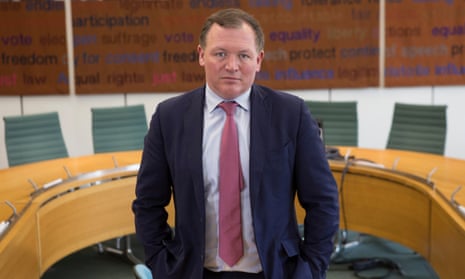Damian Collins is a few minutes late for our interview in his House of Commons office and immediately apologises. Even in normal times, as chairman of the digital, culture, media and sport committee, he has a lot on his plate. But over the last few weeks, since the Observer broke the story of the Facebook data scandal, the spotlight has fallen on this 44-year-old backbench Tory MP in a way that neither he, nor anyone else, could ever have imagined.
He describes it as a global story and believes “we are only in the foothills” of understanding its enormity, and potential repercussions. “The problem could be far bigger than we realise,” he says. An inquiry that his committee was already conducting into fake news is mushrooming into something far wider, attracting extraordinary levels of interest from across the world. It is now about Facebook and its billions of users, the security of people’s data in the digital age, and the urgent need for outdated regulatory systems and UK electoral laws to catch up with the scorching pace of technological advance. “We are at a moment,” Collins says. “It is like The Wizard of Oz. The curtain has been pulled. Our electoral law was created for a pre-internet world – and that has to change.”
When he and his all-party committee interviewed the former Cambridge Analytica whistleblower Chris Wylie on 27 March, the MPs found themselves at the centre of a media event the likes of which Westminster had never seen before. “It was the biggest ever live-streamed audience that parliament has ever had,” he says. “We were told if we were doing anything like that again, parliament would have to upgrade its IT systems to cope: 14,000 organisations from across the world were live-streaming footage at one time.”
He is deeply immersed in the detail and believes the separate inquiries by his committee, the information commissioner and the Electoral Commission could have very far-reaching implications. Asked if the misuse of data may have affected the result of the 2016 Brexit referendum, he says: “Whether we will ever be in a position to say that the level of interference was such that the result is called into question, I don’t know.”
But it is a possibility that it did? “There will need to be some public debate about that, because it will be a bigger question to say: ‘Do we think it was so compromised there has to be a rerun?’ I don’t think we are at that point yet.”
This coming week – and next – the world’s media will be feasting again on the deliberations of his committee as key figures are called in to give evidence. On Tuesday will be Brittany Kaiser, a former business development director at Cambridge Analytica. Kaiser worked to find clients for the election consultancy. “I’m so tired of making excuses for old white men”, she said last month, following revelations by the Guardian and Observer of a murky operation by suspected Israeli hackers to obtain the private emails of the current president of Nigeria, Muhammadu Buhari. Kaiser’s story of how the Israelis got their information was even worse.

Collins and his colleagues will want to tease out more of what, precisely, that story is. The day after will, potentially, be even more explosive. Alexander Nix, the former Cambridge Analytica chief executive, will appear for a second time. He has been recalled to account for “inconsistencies” in his earlier evidence.
At his previous appearance Nix denied that his company had acquired data from Aleksandr Kogan, a Cambridge University academic responsible for building the This is Your Digital Life app which amassed the data of 87 million Facebook users, much of which ultimately ended up in the hands of Cambridge Analytica.
Asked whether he thinks Nix lied last time, Collins is clear. “We asked him directly if they had got data from Kogan and he said that they hadn’t – and they had. He said this was a fairly small research project that hadn’t really gone anywhere.” So what could be the sanctions if Nix is judged to have lied to parliament?
Collins notes that there are ancient statutes which once allowed parliament to send people to prison but he doubts these could be used these days. More likely is that Nix could be forced to apologise to parliament. And if people are found to have broken the law, could the police get involved? “Ultimately if the Electoral Commission believes the law has been broken that power is absolutely there,” he says.
Even before this story blew up Collins had already made his mark, and shown how a Commons select committee can effect real changes. Previous work on the use of drugs in sport, particularly professional cycling, as well as inquires into secondary ticketing and the case of Eni Aluko, the black woman footballer who claimed she was the subject of racial prejudice from the former England manager Mark Sampson, were hugely influential in promoting change.
Now, however, he sees the committee’s central task as one of strengthening the institutions that are supposed to safeguard the UK’s democracy. The system is completely unfit for purpose in the digital age, Collins believes. The Information Commissioner’s Office urgently needs to have its powers increased, he insists, and he is pressing ministers to do this through the data protection bill now going through parliament.
“It is ridiculous that it took the information commissioner [Elizabeth Denham] five days to get a warrant to go into the offices of Cambridge Analytica and even then at the end of a relatively long process of investigation,” he says. “She needs the legal power to be able to go in and seize documents that are relevant to their inquiry because, if we don’t give them that power, then how do we know that organisations are complying with UK data protection law? We just to have to take it on trust that they are and accept that the information they share with us is accurate and true. And I don’t think that is good enough any more.”
He adds: “I also think there have to be changes around the transparency of platforms [like Facebook]. So that if you are receiving information during an election period, you know where it is coming from, who is paying for it and which organisation is promoting it. It has to be really obvious to you. At the moment it is not clear at all. In an old-fashioned election you would get a leaflet through your door and would know who sent it. You don’t know on the internet.
“I think we should look at the election law as well, and the obligations on the tech companies to make the authorities aware if they believe there is activity going on which is a breach of the law. I don’t think it is enough for them to say that they will do so only if asked to by the authorities.”
He is clear too that the way campaigns are funded during elections and referendums has to become more transparent. “The question is whether a campaign can quite easily hide its spend behind shadow groups that aren’t directly affiliated to them but which they control by proxy.” This is one of the central allegations made against Vote Leave during the referendum campaign in 2016: that it breached spending limits by allegedly working with a separate organisation, BeLeave. Was it credible that the two organisations were entirely separate when they worked from the same offices? “It is a struggle to believe,” Collins replies.
He reveals that the committee has also summoned the former director of Vote Leave, Dominic Cummings to give evidence. A date has yet to be finalised for his appearance, though he says Cummings has agreed in principle to attend. “We want to talk to him about how connected these companies were.”
Could he then go a step further and call in the two figureheads of Vote Leave, the cabinet ministers Michael Gove and Boris Johnson, and ask what they knew? He doesn’t think so at the moment, but does not close off the option. “It depends whether we think they are relevant to our investigation.”

Comments (…)
Sign in or create your Guardian account to join the discussion